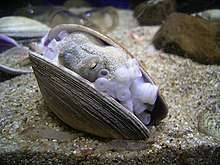Amphioctopus fangsiao
Amphioctopus fangsiao, called webfoot octopus,[2] is a species of octopus, a cephalopod belonging to the genus Amphioctopus.[3] It is found in the Pacific Ocean, including off the coasts of New Zealand.[4]
| Amphioctopus fangsiao | |
|---|---|
.jpg) | |
| Scientific classification | |
| Kingdom: | Animalia |
| Phylum: | Mollusca |
| Class: | Cephalopoda |
| Order: | Octopoda |
| Family: | Octopodidae |
| Genus: | Amphioctopus |
| Species: | A. fangsiao |
| Binomial name | |
| Amphioctopus fangsiao (d'Orbigny, 1839) | |
| Synonyms | |
Distribution
This species occurs in the Philippine Sea, the northwest Pacific and off Japan (Osaka Bay)
.jpg) Closeup of suckers
Closeup of suckers Hiding in shell
Hiding in shell
Culinary use
In Korea, Amphioctopus fangsiao is called jukkumi (주꾸미) or jjukkumi (쭈꾸미) and is often stir-fried in spicy gochujang-based sauce.[5][6]
 Jukkumi-bokkeum (stir-fried)
Jukkumi-bokkeum (stir-fried) Jukkumi-gui (grilled)
Jukkumi-gui (grilled) Seafood skewers sold in South Korea, including jju-kkochi (webfoot octopus skewers)
Seafood skewers sold in South Korea, including jju-kkochi (webfoot octopus skewers)
gollark: The Chrome build for our experimental 128-bit computers with their 741EB of RAM somehow manages to go into swap.
gollark: Nominally, yes.
gollark: *Is* the majority of badness in browsers due to mildly bigger JS code? I do not think this is true.
gollark: You wrote "redirect to arbitrary the".
gollark: It should, on success, redirect you back to the form page or something.
References
- "UNESCO-IOC Register of Marine Organisms (URMO) - Amphioctopus fangsiao (d'Orbigny, 1839)". Marinespecies.org. 2010-10-21. Retrieved 2011-08-27.
- "Webfoot octopus". FishSource. 22 May 2013. Retrieved 22 May 2017.
- "WoRMS - World Register of Marine Species - Amphioctopus fangsiao (d'Orbigny, 1839)". Marinespecies.org. 2010-10-21. Retrieved 2011-08-27.
- "Global Barcode Of Life Data Mirror". Nz.boldmirror.net. Retrieved 2011-08-27.
- Chakraborty, Shruti (3 March 2016). "Seoul Food: Hitting the streets in search of Octopus". The Indian Express. Retrieved 13 April 2017.
- Lee, Cecilia Hae-Jin (30 April 2015). "All-you-can-eat Korean BBQ at Jjukku Jjukku". Los Angeles Times. Retrieved 13 April 2017.
Further reading
- Norman M.D. & Hochberg F.G. (2005) The current state of Octopus taxonomy. Phuket Marine Biological Center Research Bulletin 66:127–154.
- Furuya, H. (2006). Three new species of dicyemid mesozoans (Phylum Dicyemida) from Amphioctopus fangsiao (Mollusca: Cephalopoda), with comments on the occurrence patterns of dicyemids. Zoological Science 23: 105–119.
This article is issued from Wikipedia. The text is licensed under Creative Commons - Attribution - Sharealike. Additional terms may apply for the media files.